Balbharti Maharashtra State Board Class 8 History Solutions
Chapter 2 Europe and India Notes, Textbook Exercise Important Questions and Answers.
Class 8 History Chapter 2 Europe and India Textbook Questions and Answers
1. Rewrite the statements by choosing the appropriate options:
Question 1.
In 1453, the city of was conquered by Ottoman Turks.
(a) Venice
(b) Constantinople
(c) Rome
(d) Paris
Answer:
(b) Constantinople
Question 2.
The Industrial Revolution began in
(a) England
(b) France
(c) Italy
(d) Portugal
Answer:
(a) England

Question 3.
…….. tried to put restrictions on the illegal trade of British.
(a) Siraj-ud-Daulah
(b) Mir Kasim
(c) Mir Jafar
(d) Shah Alam
Answer:
(b) Mir Kasim
2. Explain the following concepts:
Question 1.
Colonialism:
Answer:
1. Exploitation of one country by another and making it into a colony is called Colonialism.
2. On the basis of economic and military strength one country occupies a region of another country and establishes its political supremacy.
3. Many European nations established their colonies in various parts of the continents of America, Asia, Africa and Australia.
4. They grabbed the power by using force to exploit the colonies systematically. This gave rise to Imperialism.
Question 2.
Imperialism:
Answer:

Question 3.
Age of Renaissance:
Answer:
(1) Renaissance literally means rebirth or revival. In the latter phase of medieval Europe, reformation, religious reform movement and geographical discoveries gained momentum.
(2) It was a comprehensive movement which touched all aspects of human life. The Greek and Roman traditions in art, architecture and philosophy were revived in the Age of Renaissance.
(3) Humanitarianism got great impetus.
(4) Renaissance inspired all round progress and ushered a new era in the history of world.
(5) This developments took place from 13th century to 16th century in Europe. This period is known as the Age of Renaissance.
Question 4.
Capitalism:
Answer:
1. Many traders participated in the competition for trade with Asia after the discovery of the new sea routes to the east.
2. As it was not possible to carry out trade single-handedly, it was decided by the traders to pool their resources to raise capital for trade.
3. Many trading companies like the East India Company were formed.
4. Trade with Oriental countries was very profitable and responsible for economic prosperity.
5. The ruling powers gave protection and trade concessions to these companies.
6. This led to the accumulation of wealth in Europe. This wealth was used as capital for trade and commerce which gave rise to capitalism in Europe.
3. Explain the following statements with reasons:
Question 1.
Siraj-ud-Daulah was defeated in the Battle of Plassey.
Answer:
1. The officers of the British East India Company misused the trade concessions and built fortification around the factory in Kolkata.
2. Siraj-ud-Daulah captured the factory at Kolkata.
3. This created discontent in England.
4. Robert Clive diplomatically bribed Mir Jafar, Commander in Chief of Nawab’s army and promised to make him Nawab of Bengal.
5. So. the Army of Siraj-ud-Daulah under the command of Mir Kasim did not join the battle against the British at Plassey in 1757 AD.
6. Thus, the British won the battle of Plassey by treachery and deceit.

Question 2.
The European countries felt the necessity of finding new sea routes to Asia.
Answer:
Question 3.
European rulers started giving military protection and trade concessions to the trading companies.
Answer:
1. With the discovery of new sea routes to the east, trade with oriental countries became very profitable. Thus, European trade prospered.
2. Competition for trade began among many European nations.
3. The traders pooled their resources and formed trading companies like the East India Company.
4. As this trade brought economic prosperity, the European rulers started giving military protection and trade concessions to these trading companies.
4. Complete the following table.
Question 1.
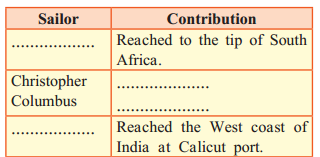
Answer:
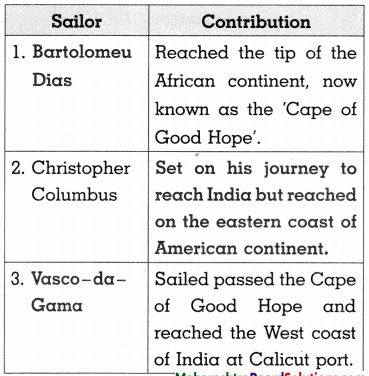
Leonardo Da Vinci :
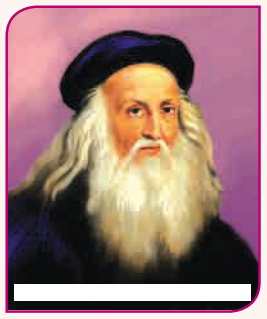

Let us Know:
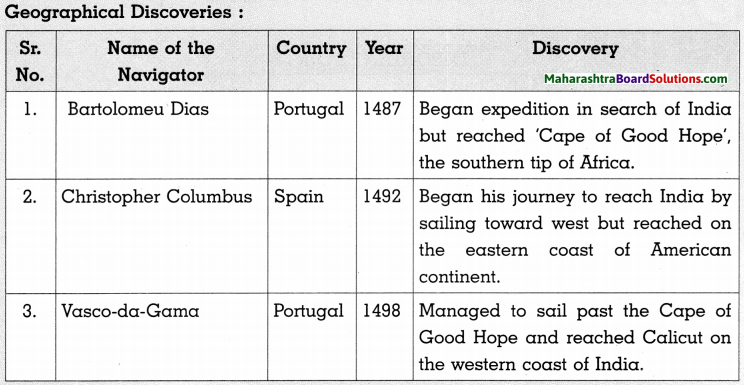
Project:
Collect information and pictures about the work of famous painters, writers, scientists during renaissance period with the help of reference books and internet. Present a project on it in the classroom.
Class 8 History Chapter 2 Europe and India Additional Important Questions and Answers
Rewrite the statements by choosing the appropriate options:
Question 1.
American colonies organised the army under the leadership of and won against England.
(a) Thomas Jefferson
(b) Robert Clive
(c) George Washington
(d) Johannes Gutenberg
Answer:
(c) George Washington

Question 2.
The British East India Company established its factory at
(a) Kolkata
(b) Cochin
(c) Mumbai
(d) Surat
Answer:
(d) Surat
Question 3.
Siraj-ud-Daulah was defeated because diplomatically bribed Mir Jafar.
(a) Robert Clive
(b) Lord Wellesley
(c) Lord Dalhousie
(d) Lord Cornwallis
Answer:
(a) Robert Clive
Question 4.
Tipu Sultan died in the battle of in 1799.
(a) Mysore
(b) Bengaluru
(c) Srirangapatna
(d) Buxar
Answer:
(c) Srirangapatna
Question 5.
The chieftain of rose against the British.
(a) Multan
(b) Bengal
(c) Carnatic
(d) Jhansi
Answer:
(a) Multan

Question 6.
was the first Portuguese sailor who landed on the western coast of India.
(a) Christopher Columbus
(b) Bartolomeu Días
(c) Vasco-da- Gama
(d) Leonardo da Vinci
Answer:
(c) Vasco-da- Gama
Question 7.
England established colonies on the eastern coast of America.
(a) ten
(b) thirteen
(c) eight
(d) seventeen
Answer:
(b) thirteen

Name the following:
Question 1.
Invented printing press
Answer:
Johannes Gutenberg
Question 2.
Empire of Ottoman Turks
Answer:
Byzantine
Question 3.
The Bill which laid limitations on powers of the King in England.
Answer:
Bill of Rights

Question 4.
Mughal Emperor who gave permission to Britishers to establish factory at Surat.
Answer:
Emperor Jahangir
Question 5.
Came to be known as ‘World Factory’.
Answer:
England.
Answer the following in one sentence:
Question 1.
Which period in the history of Europe is known as Period of Renaissance?
Answer:
In the history of Europe, the last phase of medieval period i.e. 13th to century in Europe is known as the Period of Renaissance.
Question 2.
Name the developments that laid the foundation of modern era.
Answer:
The Renaissance, the Reformation and the geographical discoveries laid the foundation of the modern era.

Question 3.
State the significance of the invention of printing press.
Answer:
It became possible to take new ideas, new concepts and knowledge to all the sections of society due to the invention of the printing press.
Question 4.
What was the effect of the Reformation movement in the area of religion?
Answer:
Individual freedom and rationalism gained importance in the area of religion due to the Reformation movement.
Question 5.
State the principles that the French Revolution gave to the world.
Answer:
The French Revolution gave the principles of liberty equality and fraternity to the world.
Question 6.
Why did the British establish East India Company?
Answer:
The British established the East India Company to carry out trade in India.

Question 7.
What was the outcome of the American War of Independence?
Answer:
Due to American War of Independence, a new nation known as the United States of America with a federal government, written constitution and based on the principles of democracy was formed.
Do as Directed:
1. Complete the concept Map:
Question 1.
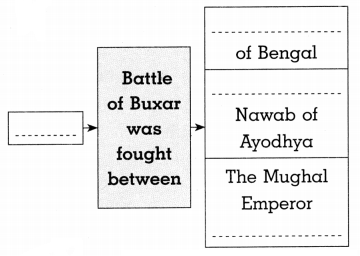
Answer:
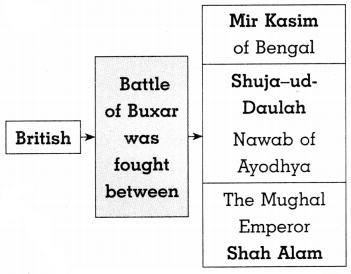
Question 2.
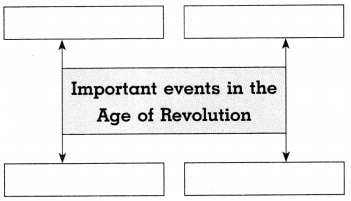
Answer:
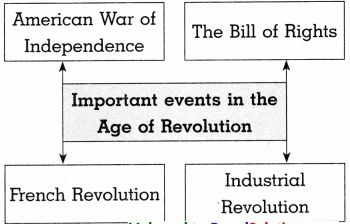
2. Arrange the following events in chronological order on timeline:
1. Battle of Srirangapatna
2. Second Anglo-Sikh War
3. Battle of Buxar
4. Battle of Plassey
Answer:
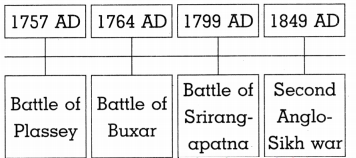
Write short notes:
Question 1.
Leonardo-da-Vinci:
Answer:
Question 2.
Carnatic Wars :
Answer:

Question 3.
The Battle of Buxar:
Answer:
Explain the following statements with reasons:
Question 1.
The period between 18th and 19th century came to be known as ‘Age of Revolutions’.
Answer:
1. The British Parliament passed The Bill of Rights in 1689. It established sovereignty of Parliament and curtailed powers of the King.
2. This gave momentum to the development of Parliamentary Democracy in England.
3. The thirteen British colonies in America won the War of Independence in 1783.
4. These thirteen colonies established the first federal republic, known as the United States of America.
5. The people of France revolted against the unjust and uncontrolled monarchy and feudalism. They established a Republic.
6. The Industrial Revolution in Europe in the latter part of the 18th century brought revolutionary changes in Europe.
7. These changes had long-lasting effect on the entire world.
8. All these revolutionary events took place during 18th and 19th century period. Hence it is known as the ‘Age of Revolutions’.
Question 2.
England was described as World Factory.
Answer:

Question 3.
The British captured Sindh in 1843.
Answer:
Answer the following questions in 25 to 30 words:
Question 1.
Write about the Religious Reform Movement.
Answer:
Question 2.
What is Intellectual Revolution?
Answer:
Question 3.
State the significance of French Revolution.
Answer:
Question 4.
What were the changes brought about by the Industrial Revolution in the system of production?
Answer:

Question 5.
How did the conflict between Siraj- ud-Daulah and the British start?
Answer:
Question 6.
Why were the Sikhs defeated in the First Anglo-Sikh War?
Answer:
Question 7.
What brought an end to the Sikh rule in Punjab in 1849?
Answer:
Answer the following questions in detail: (4 marks each)
Question 1.
Give detailed account of Renaissance.
Answer:
The foundation of Renaissance period was laid between 13th century and 16th century in Europe.

Question 2.
Give information about American War of Independence.
Answer:
1. After the discovery of American continent, the imperialist European powers took control of different regions of America and established their colonies.
2. England established 13 colonies on the East coast of America.
3. Initially, England kept nominal domination but later British Parliament laid oppressive restrictions and taxes on the colonies.
4. This created discontent among the people and the colonies revolted.
5. George Washington led the American army in the war against England.
6. The colonies won the war and established the first federal democratic republic, known as the United States of America.
7. USA became the first country in the world to have a written constitution and was based on the principles of Democracy.
Question 3.
What according to you are the advantages of Religious Reform Movement?
Answer:
With changing times we find changes in every field. Religious reforms are part of this process. I feel the following are the advantages of Religious Reforms Movement.
Chapter 2 Europe and India Notes, Textbook Exercise Important Questions and Answers.
Class 8 History Chapter 2 Europe and India Textbook Questions and Answers
1. Rewrite the statements by choosing the appropriate options:
Question 1.
In 1453, the city of was conquered by Ottoman Turks.
(a) Venice
(b) Constantinople
(c) Rome
(d) Paris
Answer:
(b) Constantinople
Question 2.
The Industrial Revolution began in
(a) England
(b) France
(c) Italy
(d) Portugal
Answer:
(a) England

Question 3.
…….. tried to put restrictions on the illegal trade of British.
(a) Siraj-ud-Daulah
(b) Mir Kasim
(c) Mir Jafar
(d) Shah Alam
Answer:
(b) Mir Kasim
2. Explain the following concepts:
Question 1.
Colonialism:
Answer:
1. Exploitation of one country by another and making it into a colony is called Colonialism.
2. On the basis of economic and military strength one country occupies a region of another country and establishes its political supremacy.
3. Many European nations established their colonies in various parts of the continents of America, Asia, Africa and Australia.
4. They grabbed the power by using force to exploit the colonies systematically. This gave rise to Imperialism.
Question 2.
Imperialism:
Answer:

Question 3.
Age of Renaissance:
Answer:
(1) Renaissance literally means rebirth or revival. In the latter phase of medieval Europe, reformation, religious reform movement and geographical discoveries gained momentum.
(2) It was a comprehensive movement which touched all aspects of human life. The Greek and Roman traditions in art, architecture and philosophy were revived in the Age of Renaissance.
(3) Humanitarianism got great impetus.
(4) Renaissance inspired all round progress and ushered a new era in the history of world.
(5) This developments took place from 13th century to 16th century in Europe. This period is known as the Age of Renaissance.
Question 4.
Capitalism:
Answer:
1. Many traders participated in the competition for trade with Asia after the discovery of the new sea routes to the east.
2. As it was not possible to carry out trade single-handedly, it was decided by the traders to pool their resources to raise capital for trade.
3. Many trading companies like the East India Company were formed.
4. Trade with Oriental countries was very profitable and responsible for economic prosperity.
5. The ruling powers gave protection and trade concessions to these companies.
6. This led to the accumulation of wealth in Europe. This wealth was used as capital for trade and commerce which gave rise to capitalism in Europe.
3. Explain the following statements with reasons:
Question 1.
Siraj-ud-Daulah was defeated in the Battle of Plassey.
Answer:
1. The officers of the British East India Company misused the trade concessions and built fortification around the factory in Kolkata.
2. Siraj-ud-Daulah captured the factory at Kolkata.
3. This created discontent in England.
4. Robert Clive diplomatically bribed Mir Jafar, Commander in Chief of Nawab’s army and promised to make him Nawab of Bengal.
5. So. the Army of Siraj-ud-Daulah under the command of Mir Kasim did not join the battle against the British at Plassey in 1757 AD.
6. Thus, the British won the battle of Plassey by treachery and deceit.

Question 2.
The European countries felt the necessity of finding new sea routes to Asia.
Answer:
Question 3.
European rulers started giving military protection and trade concessions to the trading companies.
Answer:
1. With the discovery of new sea routes to the east, trade with oriental countries became very profitable. Thus, European trade prospered.
2. Competition for trade began among many European nations.
3. The traders pooled their resources and formed trading companies like the East India Company.
4. As this trade brought economic prosperity, the European rulers started giving military protection and trade concessions to these trading companies.
4. Complete the following table.
Question 1.

Answer:

Leonardo Da Vinci :


Let us Know:

Project:
Collect information and pictures about the work of famous painters, writers, scientists during renaissance period with the help of reference books and internet. Present a project on it in the classroom.
Class 8 History Chapter 2 Europe and India Additional Important Questions and Answers
Rewrite the statements by choosing the appropriate options:
Question 1.
American colonies organised the army under the leadership of and won against England.
(a) Thomas Jefferson
(b) Robert Clive
(c) George Washington
(d) Johannes Gutenberg
Answer:
(c) George Washington

Question 2.
The British East India Company established its factory at
(a) Kolkata
(b) Cochin
(c) Mumbai
(d) Surat
Answer:
(d) Surat
Question 3.
Siraj-ud-Daulah was defeated because diplomatically bribed Mir Jafar.
(a) Robert Clive
(b) Lord Wellesley
(c) Lord Dalhousie
(d) Lord Cornwallis
Answer:
(a) Robert Clive
Question 4.
Tipu Sultan died in the battle of in 1799.
(a) Mysore
(b) Bengaluru
(c) Srirangapatna
(d) Buxar
Answer:
(c) Srirangapatna
Question 5.
The chieftain of rose against the British.
(a) Multan
(b) Bengal
(c) Carnatic
(d) Jhansi
Answer:
(a) Multan

Question 6.
was the first Portuguese sailor who landed on the western coast of India.
(a) Christopher Columbus
(b) Bartolomeu Días
(c) Vasco-da- Gama
(d) Leonardo da Vinci
Answer:
(c) Vasco-da- Gama
Question 7.
England established colonies on the eastern coast of America.
(a) ten
(b) thirteen
(c) eight
(d) seventeen
Answer:
(b) thirteen

Name the following:
Question 1.
Invented printing press
Answer:
Johannes Gutenberg
Question 2.
Empire of Ottoman Turks
Answer:
Byzantine
Question 3.
The Bill which laid limitations on powers of the King in England.
Answer:
Bill of Rights

Question 4.
Mughal Emperor who gave permission to Britishers to establish factory at Surat.
Answer:
Emperor Jahangir
Question 5.
Came to be known as ‘World Factory’.
Answer:
England.
Answer the following in one sentence:
Question 1.
Which period in the history of Europe is known as Period of Renaissance?
Answer:
In the history of Europe, the last phase of medieval period i.e. 13th to century in Europe is known as the Period of Renaissance.
Question 2.
Name the developments that laid the foundation of modern era.
Answer:
The Renaissance, the Reformation and the geographical discoveries laid the foundation of the modern era.

Question 3.
State the significance of the invention of printing press.
Answer:
It became possible to take new ideas, new concepts and knowledge to all the sections of society due to the invention of the printing press.
Question 4.
What was the effect of the Reformation movement in the area of religion?
Answer:
Individual freedom and rationalism gained importance in the area of religion due to the Reformation movement.
Question 5.
State the principles that the French Revolution gave to the world.
Answer:
The French Revolution gave the principles of liberty equality and fraternity to the world.
Question 6.
Why did the British establish East India Company?
Answer:
The British established the East India Company to carry out trade in India.

Question 7.
What was the outcome of the American War of Independence?
Answer:
Due to American War of Independence, a new nation known as the United States of America with a federal government, written constitution and based on the principles of democracy was formed.
Do as Directed:
1. Complete the concept Map:
Question 1.

Answer:

Question 2.

Answer:

2. Arrange the following events in chronological order on timeline:
1. Battle of Srirangapatna
2. Second Anglo-Sikh War
3. Battle of Buxar
4. Battle of Plassey
Answer:

Write short notes:
Question 1.
Leonardo-da-Vinci:
Answer:
Question 2.
Carnatic Wars :
Answer:

Question 3.
The Battle of Buxar:
Answer:
Explain the following statements with reasons:
Question 1.
The period between 18th and 19th century came to be known as ‘Age of Revolutions’.
Answer:
1. The British Parliament passed The Bill of Rights in 1689. It established sovereignty of Parliament and curtailed powers of the King.
2. This gave momentum to the development of Parliamentary Democracy in England.
3. The thirteen British colonies in America won the War of Independence in 1783.
4. These thirteen colonies established the first federal republic, known as the United States of America.
5. The people of France revolted against the unjust and uncontrolled monarchy and feudalism. They established a Republic.
6. The Industrial Revolution in Europe in the latter part of the 18th century brought revolutionary changes in Europe.
7. These changes had long-lasting effect on the entire world.
8. All these revolutionary events took place during 18th and 19th century period. Hence it is known as the ‘Age of Revolutions’.
Question 2.
England was described as World Factory.
Answer:

Question 3.
The British captured Sindh in 1843.
Answer:
Answer the following questions in 25 to 30 words:
Question 1.
Write about the Religious Reform Movement.
Answer:
Question 2.
What is Intellectual Revolution?
Answer:
Question 3.
State the significance of French Revolution.
Answer:
Question 4.
What were the changes brought about by the Industrial Revolution in the system of production?
Answer:

Question 5.
How did the conflict between Siraj- ud-Daulah and the British start?
Answer:
Question 6.
Why were the Sikhs defeated in the First Anglo-Sikh War?
Answer:
Question 7.
What brought an end to the Sikh rule in Punjab in 1849?
Answer:
Answer the following questions in detail: (4 marks each)
Question 1.
Give detailed account of Renaissance.
Answer:
The foundation of Renaissance period was laid between 13th century and 16th century in Europe.

Question 2.
Give information about American War of Independence.
Answer:
1. After the discovery of American continent, the imperialist European powers took control of different regions of America and established their colonies.
2. England established 13 colonies on the East coast of America.
3. Initially, England kept nominal domination but later British Parliament laid oppressive restrictions and taxes on the colonies.
4. This created discontent among the people and the colonies revolted.
5. George Washington led the American army in the war against England.
6. The colonies won the war and established the first federal democratic republic, known as the United States of America.
7. USA became the first country in the world to have a written constitution and was based on the principles of Democracy.
Question 3.
What according to you are the advantages of Religious Reform Movement?
Answer:
With changing times we find changes in every field. Religious reforms are part of this process. I feel the following are the advantages of Religious Reforms Movement.